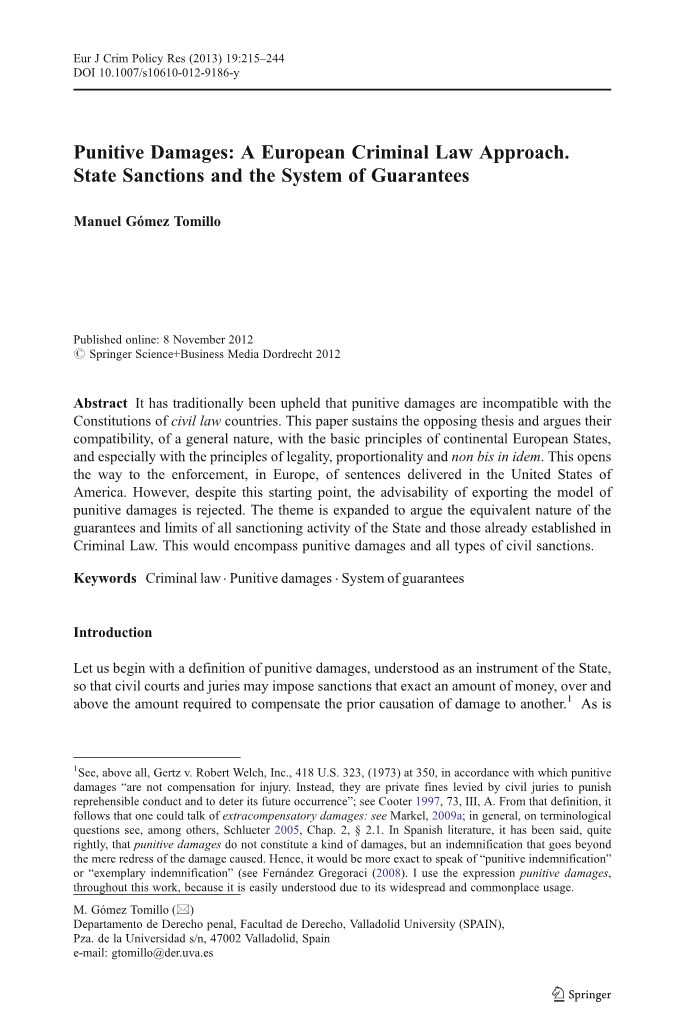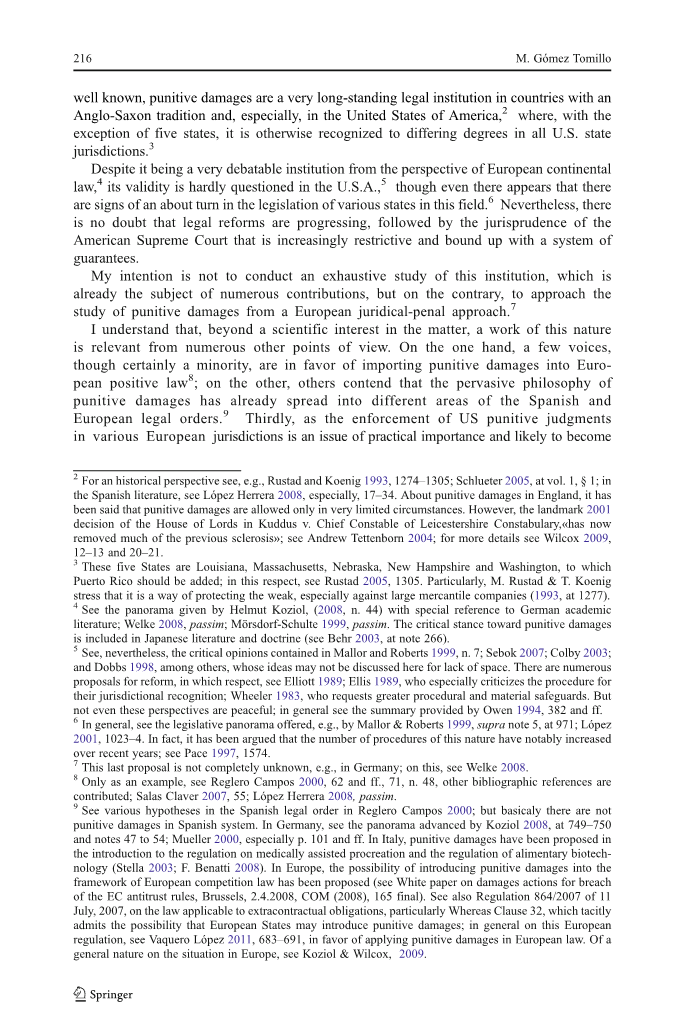

英语原文共 30 页,剩余内容已隐藏,支付完成后下载完整资料
Punitive Damages: A European Criminal Law Approach.State Sanctions and the System of Guarantees
Abstract:It has traditionally been upheld that punitive damages are incompatible with the Constitutions of civil law countries. This paper sustains the opposing thesis and argues their compatibility, of a general nature, with the basic principles of continental European States,and especially with the principles of legality, proportionality and non bis in idem. This opens the way to the enforcement, in Europe, of sentences delivered in the United States of America. However, despite this starting point, the advisability of exporting the model of punitive damages is rejected. The theme is expanded to argue the equivalent nature of the guarantees and limits of all sanctioning activity of the State and those already established in Criminal Law. This would encompass punitive damages and all types of civil sanctions.
Keywords: Criminal law . Punitive damages . System of guarantees
Introduction
Let us begin with a definition of punitive damages, understood as an instrument of the State,so that civil courts and juries may impose sanctions that exact an amount of money, over and above the amount required to compensate the prior causation of damage to another. As is well known, punitive damages are a very long-standing legal institution in countries with an Anglo-Saxon tradition and, especially, in the United States of America, where, with the exception of five states, it is otherwise recognized to differing degrees in all U.S. State jurisdictions.
Despite it being a very debatable institution from the perspective of European continental law, its validity is hardly questioned in the U.S.A.,though even there appears that there are signs of an about turn in the legislation of various states in this field. Nevertheless, there is no doubt that legal reforms are progressing, followed by the jurisprudence of the American Supreme Court that is increasingly restrictive and bound up with a system of guarantees.
My intention is not to conduct an exhaustive study of this institution, which is already the subject of numerous contributions, but on the contrary, to approach the study of punitive damages from a European juridical-penal approach.
I understand that, beyond a scientific interest in the matter, a work of this nature is relevant from numerous other points of view. On the one hand, a few voices, though certainly a minority, are in favor of importing punitive damages into European positive law; on the other, others contend that the pervasive philosophy of punitive damages has already spread into different areas of the Spanish and European legal orders. Thirdly, as the enforcement of US punitive judgments in various European jurisdictions is an issue of practical importance and likely to become more so. Likewise, the growing expansion of punitive systems targeting legal persons in Europe should not be forgotten (Spain has recently incorporated that possibility into its positive law); it is precisely these and not physical persons that are affected by punitive law, for which reason there is an overlap between the criteria for the imputation of liability in both fields. Finally, it should be borne in mind that the development of U.S. Supreme Court jurisprudence on these matters adds to the guarantees that protect the defendant in punitive damage suits. Hence, it may be a good moment to ask whether the customary criticisms to which it is so often subjected from the European perspective are fully justified. There is no doubt that many prejudices, topics and misunderstandings exist on this matter, which can be overcome through an all-too-often limited dialogue between scholars working in civil law countries and those that do so in common law countries.
Part I of this work begins with the juridical nature of punitive damages, which is used to argue for the application of criminal law guarantees to all state punitive activity. In Part II, I study the question of whether current North-American punitive damages fit in with the basic material constitutional principles of the civil law States, especially the legality principle, and within it, the rule nulla poena sine lege. In Part III, punitive damages are studied from the perspective of the prohibition against double jeopardy. The study concludes with a brief analysis of the political-legislative pros and cons that punitive damages represent, leaving aside any consideration of legal-constitutional proposals.
Punitive Damages and the Guarantees of State Sanctions law
Legal Nature of Punitive Damages
As is well known, the prevailing view is, without a doubt, one that maintains the criminal nature of punitive damages, regardless the fact that they are awarded by civil courts. However, some dissenting voices may be heard.
From my perspective, the majority point of view is correct, at least, if we disregard the consideration that punitive damages allow the claimant to recover the costs of litigation; a factor that would give them a certain compensatory nature. The terminology in itself is significant. On the majority of occasions, the expression “punitive damages” is preferred, a concept that itself connotes retribution. Much less frequently, on other occasions, reference is made to exemplary damages, an idea that suggests deterrence, or even the goal of achieving general deterrence. Certainly, there is no reason why an automatic correlation should exist between the terminology in use and the motivation attributed to it. However, the penal nature is particularly clear from three standpoints.
First of all, there are many circumstances in which the application of punitive damages is authorized and the facts are simultaneously constitutive of a criminal offence, with the important proviso that the
剩余内容已隐藏,支付完成后下载完整资料
资料编号:[148903],资料为PDF文档或Word文档,PDF文档可免费转换为Word


